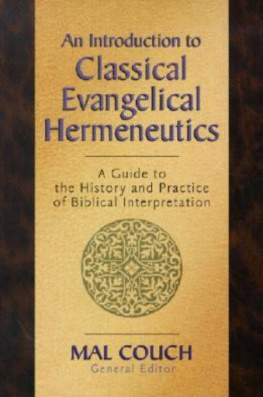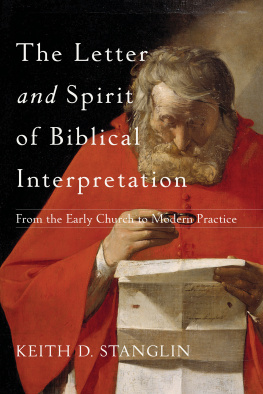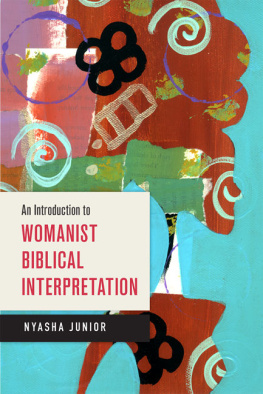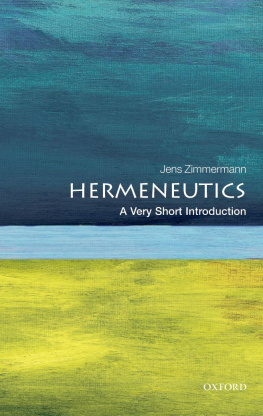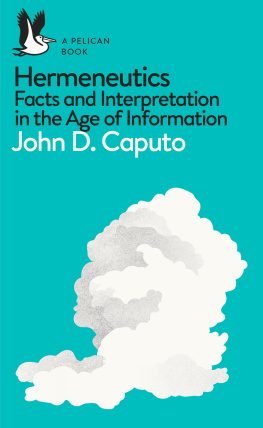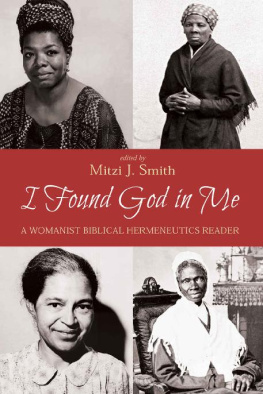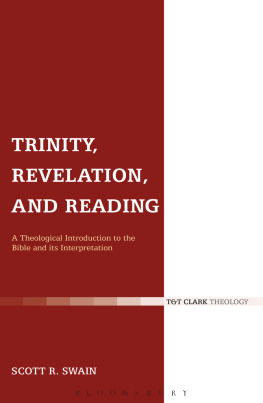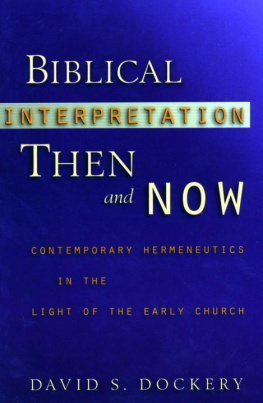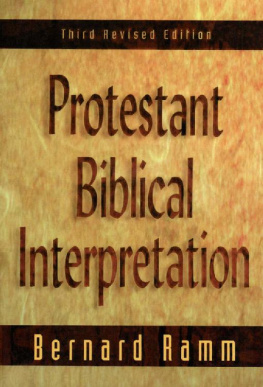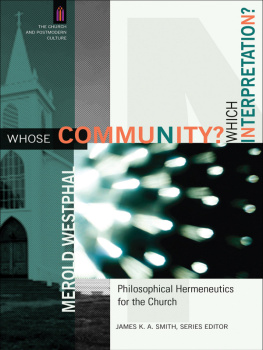






In honor of The Conservative Theological Society whose purpose is to call evangelical Christians to a renewed love of biblical truth.
For information about the organization or its publication The Conservative Theological Journal, contact The Conservative Theological Society 6800 Brentwood Stair Fort Worth, TX 76112
Contents
.............................. 7
Part 1: God Has Spoken
Chapter 1: .......................... 11
Chapter 2: ................... 15
Chapter 3: ...... 32
Chapter 4: ....................... 48
Chapter 5: ................. 52
Chapter 6: ............. 71
Part 2: Interpretive Systems Throughout History
Chapter 7: ........... 87
Chapter 8: .......... 95
Chapter 9: ................................ 104
Chapter 10: ........ 128
Chapter 11: . 139
Part 3: Interpreting the Church
Chapter 12: ............................. 157
Chapter 13: ................... 164
Chapter 14: ............. 182
Chapter 15: . 192
Chapter 16: ....................... 199
Chapter 17: ... 210
Chapter 18: ................ 221
Chapter 19: ...................... 227
Chapter 20: ......................... 236
Part 4: Interpreting Prophecy
Chapter 21: .... 255
Chapter 22: ..................... 291
Chapter 23: ................ 300
...... 317
............................... 333
.......................... 359
........................... 367
Acknowledgments for material previously published may be found at the end of a chapter. The permission of other copyright holders to include their material in this work is gratefully acknowledged by the editor. Unless so noted, chapters in this work are the collaborative effort of the contributors; therefore, no individual contributor is acknowledged as the author of such chapters.
Contributors
Mal Couch, M.A., Th.M., Th.D., Ph.D., is founder and president of Tyndale Theological Seminary in Fort Worth, Texas, and general editor of the award-winning Dictionary of Premillennial Theology.
Larry V. Crutchfield, M.A., M.Phil., Ph.D., is a freelance writer and Professor of Early Church History and Culture at Columbia Evangelical Seminary, Longview, Washington.
Thomas 0. Figart, Th.M., Th.D., is Distinguished Professor of Biblical Education at Lancaster Bible College, Lancaster, Pennsylvania.
Bobby Hayes, M.A., Ph.D. candidate, is an associate professor at Tyndale Theological Seminary and Biblical Institute, Fort Worth, Texas.
Ron M. Johnson, M.B.A., D.Min., Ph.D. candidate, is senior pastor of Indian Trail Community Church in Spokane, Washington.
Russell L. Penney, M.A., D.Sc., Th.D., is a missionary teacher at Seminario Teologico Hebron (Hebron Theological Seminary) in Santa Cruz de la Sierra, Bolivia.
Paul Lee Tan, Th.M., Th.D., is founder and president of Bible Communications, Dallas, Texas. Dr. Tan is the compiler of the popular Encyclopedia of 7700 Illustrations.
PART 1
God Has Spoken
CHAPTER I
God Has Spoken
Almost all Christians believe that the Bible is the Word of God. They believe that the Lord has spoken and revealed Himself, His will, and the way of salvation in the revelation of the Old and New Testaments. Disagreements exist, however, about the interpretation and meaning of some areas of the biblical message.
A great many within the evangelical camp hold strongly to the doctrines of revelation, inspiration, and even inerrancy of the original texts of Scripture. Since the Reformation, evangelicals as a whole claim to take the Word of God literally, reading the prophets and apostles in a literal manner and accepting the historicity of the Scriptures at face value.
Where, then, is the greatest area of disagreement among Christians? And is the disagreement minor or major? Does it affect the overall thrust of the biblical message?
Among evangelicals there are generally two major camps regarding how prophetic passages should be read. Amillennialists will generally allegorize large portions of the prophetic Word, especially passages that speak of the Second Advent of Christ and the establishment of the one-thousand-year literal Davidic kingdom. In contrast, premillennialists, following the teaching of the early church, treat the Second Coming with the same literal hermeneutic as they would the First Coming of Jesus. They hold that the Bible, from Genesis to Revelation, should be understood literally from a normal reading unless typology or poetry is clearly used. And even then, premillennialists believe that "literalness" is implied behind the figure of speech or illustration used.
Amillennialism may be defined as follows:
The amillennial view holds that the kingdom promises in the Old Testament are fulfilled spiritually rather than literally in the New Testament church. Those who hold this view believe that Christ will literally return, but they do not believe in His thousand-year reign on the earth.'
Though the amillennial scholar Berkhof claims to hold to an overall literal approach to the Bible, in the area of future prophecy he does not. Without elaboration, he writes on the subject of prophecy,
Under the guidance of the Holy Spirit, "the prophets occasionally transcended their historical and dispensational limitations, and spoke in forms that pointed to a more spiritual dispensation in the future." In such cases the prophetic horizon was enlarged, they sensed something of the passing character of the old forms, and gave ideal descriptions of the blessings of the New Testament Church.'

